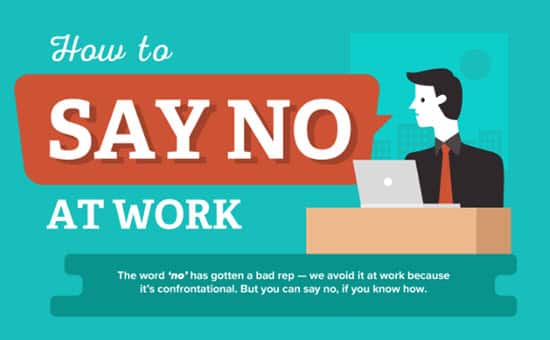When was the last time you said ‘no’ at work? There’s no shame in being the guy who says ‘yes’: taking on work indiscriminately is the sign of a healthy work ethic – but whether it’s a productive work ethic or not is another matter. And, unfortunately, the willingness to take on every task you’re assigned can sometimes be caught up in other, less positive attributes: fear of losing out, pride in handling everything that’s thrown at you, or simply the inability to assess and manage your own schedule.
If you take on tasks that you don’t have time to complete, or that will impact negatively on the rest of your workload, you are not just letting yourself in for a hard time – you are compromising the level of what you can achieve for your business, your boss and/or your client. If you decide to turn a project down, saying ‘no’ can be the most difficult part. If you fear the wrath of the person to whom you’re declining, try to remain confident in the knowledge that ultimately it’s the best solution for everyone.
Therefore, transparency is the best way to proceed. Take some time to clarify for yourself the reasons that you can’t take the work on, and potential solutions. Be bold and honest, and you will retain their understanding and respect. This isn’t the moment for excuses, but for reason. Meet them in person (rather than sending an email) – you can ensure you’ve been understood properly and it will be easier to make your point.
If you’re working as part of a team or community, you may know someone who is better suited to take the work on. Again, this may be what throws you in a quandary about whether to turn the work down: perhaps you’re concerned that redirecting work on one occasion may see you overlooked next time around. It’s a legitimate fear, but ask yourself: is it better to suck it up and submit inferior work, or to offer a better solution that keeps everyone happy? Pass along a tasty assignment, and you should be remembered positively by client and colleague alike: you will position yourself as a helpful and resourceful part of the ecosystem. It all comes back around eventually.
On the other hand, if you’re passing on a less savory task and you’re concerned your boss will think you’re shirking, face up to the music and ask for help. Arrange a meeting to discuss your schedule. Use the opportunity to discuss the implications of overwork and to try to solve the issue together: maybe you need more overtime, more workable deadlines, or perhaps some help prioritizing and scheduling. Approached with honesty and maturity, hopefully your boss should see sense.
If transparency is the foundation of this approach, gratitude is an element not to overlook. Whether you’re saying no to an appealing bit of business, or asserting yourself regarding your employer’s unrealistic expectations, these are the people that pay your salary. Expressing thanks at having been considered for the task is a valuable way of maintaining relations even as you’re forced to turn it down. A client should be thanked for the potential business and asked to remember you next time; a boss can be thanked for considering your talents to be suitable to the job at hand – and for having confidence in you to complete such a heavy workload! So finally, when you’ve met with the person, explained your position and offered alternatives, remember to say thank you. After all, having too much work can be a privilege that others would love to have.
These ideas and more are collected in a new infographic from The Business Backer. Be sure to read and digest them next time you’re unsure how to deal with a request too far.
This is a guest post from John Cole. John is a digital nomad and freelance writer. Specialising in leadership, digital media and personal growth, his passions include world cinema and biscuits. A native Englishman, he is always on the move, but can most commonly be spotted in Norway, the UK and the Balkans.
(Image Source: The Business Backer)
